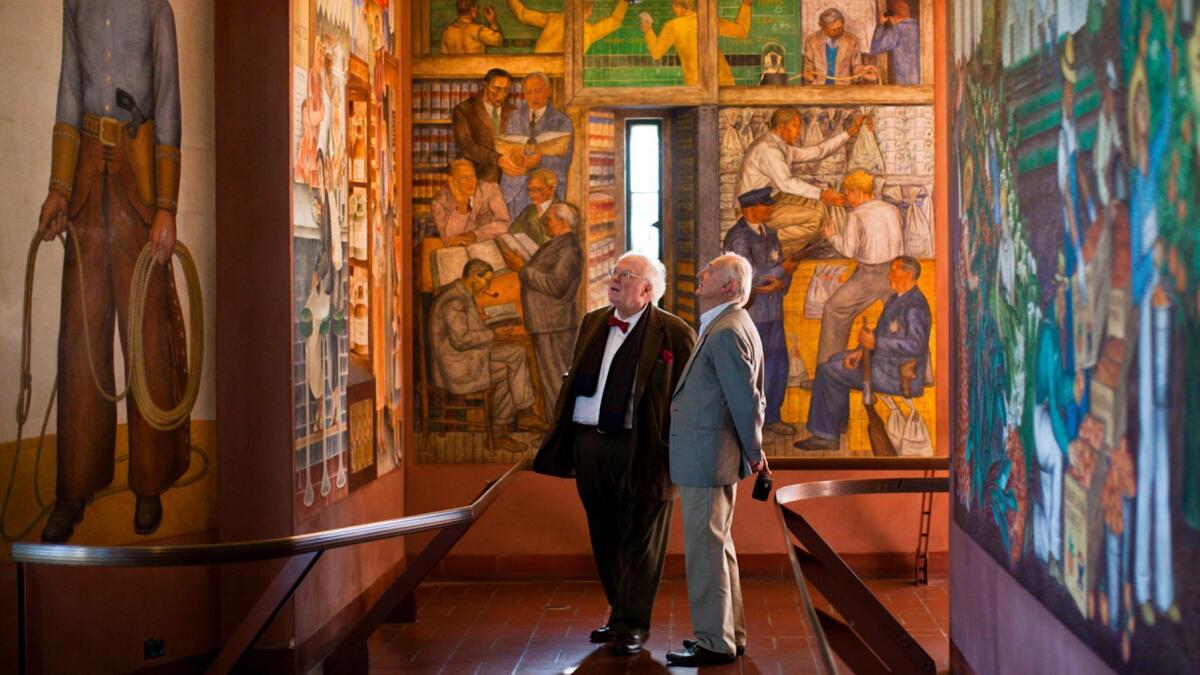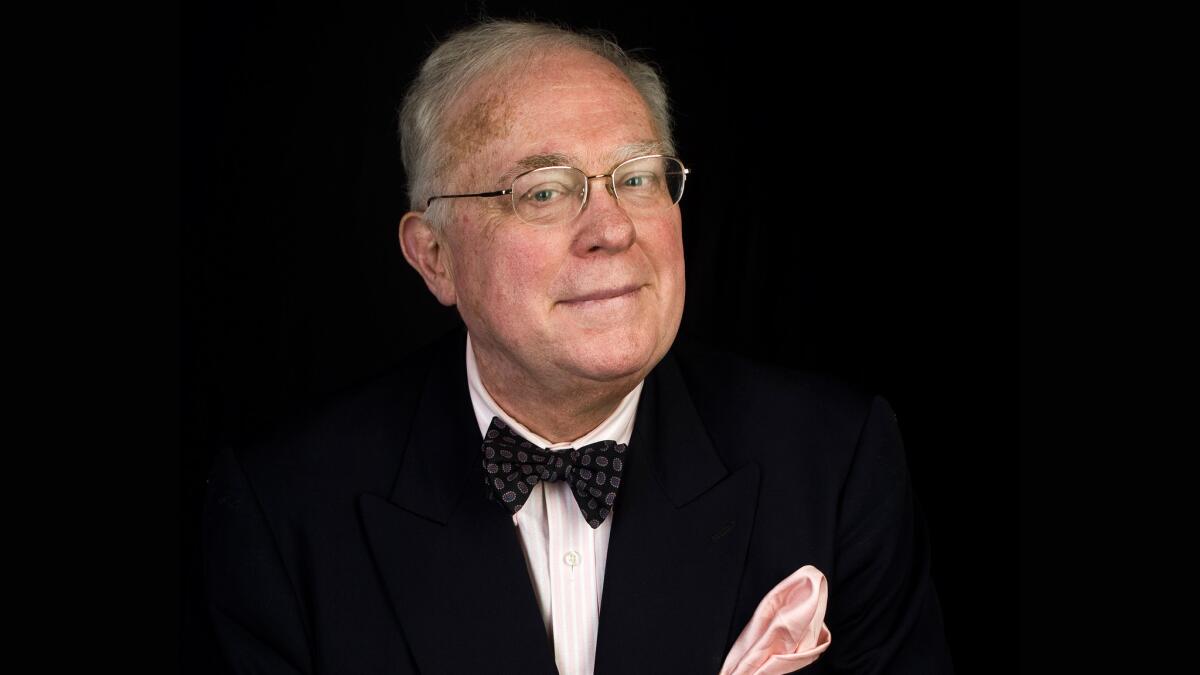Kevin Starr will never be replaced: William Deverell remembers the historian and author

- Share via
Kevin Starr mastered the stage whisper. At a stiff faculty or committee meeting, and with twinkle in his eye, he’d bring a hand or a book to his mouth, and, thus poorly disguised, offer a thought, a bon mot, an impertinent question, or even a joke. It was his version of sotto voce, but it came out basso profundo, since he raised, instead of lowered, his voice when he spoke in this way. He sometimes began laughing even before he’d finished speaking.
I knew Kevin Starr only as profundo. He was big, his voice was big, his persona was big, his books are big, his ideas are big, his influence is big. Some, and only some, of this has now been silenced by his death Saturday. Kevin’s outsize impact and his sheer significance to both our regional and our national culture, will continue long hence. Death has robbed us of the most important guide we have ever had to our state’s history and culture, our ingenious interpreter of the elusive and many meanings of the California Dream over several centuries.
Half a century ago, Starr wrote a doctoral thesis in the American Civilization program at Harvard. Under the supervision of Alan Heimert, Harvard’s brilliant young scholar of 18th century American religion, Kevin set out to write on a Great Awakening of a different sort: California’s imaginative hold on the American psyche. The thesis became “Americans and the California Dream, 1850-1915.” That book launched an intellectual pilgrimage based on a deceptively simple query: What is the meaning — and the condition — of the “California Dream” through time?
Each of the more than half-dozen sequels is another illumination of the history of California. The whole is more than the parts. Each book is pinned, across eras or decades, to the California Dream at this or that moment in time. A redemptive California, a civilization made of the best hopes and dreams of the young nation, embodies the first book, and this idea animates the full series. Californians, Starr insists, can rise above the worst impulses of greed, violence or racism and, in so doing, render the state as “a city upon a hill” for the rest of the nation and the world.
Kevin loved institutions with an infectious faith. He was not naive: He knew institutions could be cold, and his commitment was not slavish. He loved them for their traditions, their histories, their devotion to mission. He delighted in studying them. First among them (“my alpha, my piety,” I can hear him say) came the Catholic Church, an institution that inspired more dreaming in him than even his beloved California. His book “Continental Ambitions: Roman Catholics in North America: The Colonial Experience,” the first of a multi-volume history, appeared a few months ago, and Kevin was hard at work on the next at the time of his death.
Others that shaped and inspired him: the Army, libraries ancient and modern, universities here and abroad, venerable publishing houses and book clubs. He spoke often and devotedly about the California State Library, an institution he ran for a decade, and about USC, where he held the distinguished title university professor. Through his work, California itself became an institution that invited study: its rules, its leaders and its people, its institutional cultures, its historical trajectories. Kevin knew institutions, and he knew how to illuminate them by his words, how to praise them and how to insist that they could do and be better.

But he also knew individuals. Thomas Aquinas. Herodotus. The Marquis de Lafayette. John Adams. Anne Hutchinson. James Fenimore Cooper. John Foster Dulles. St. Francis. Junípero Serra. Martin Luther. The Rev. Martin Luther King Jr. Lunch with Kevin could include quotations, references and clairvoyant discussions with these figures and so many others. In English, mostly, although Latin phrases rolled off his tongue effortlessly. One went away from an hour’s discussion as if exiting the confessional after a session with the monsignor. You were inspired by the majesty of it all — History with a capital H — but you also had pangs of guilt for obviously not studying hard enough in graduate school. Kevin had a secular rosary exercise always at ready, penance offered as exhortation. “You must read Prescott,” he’d insist. Or Irving, the collected works. “What?” He would thunder in that profundo. “You have not read all of Toynbee? You must, Bill, you must.” Another day, another conversation, and it might be Tacitus, Gibbon or Carlyle. Or he’d open with “Gallia est omnis divisa in partes tres.” None of it, or at least not very much of it, was for show. It was just Kevin.
Over the last several decades, Kevin and I often appeared on the dais together. When that began, I was in an apprentice role, and that deepened into a kind of senior/junior partner arrangement. No one was better in expository speaking than Kevin, though repetition crept into his remarks in recent years. He never failed to smirk that he wanted to title his volume on 1960s California “Smoking the Dream.” But it was a good line, and it was funny.
I was there at a conference in which Kevin was the keynote speaker and others of us were minor academic accompaniment. In the green room ahead of time, the organizer graciously thanked Kevin, remarked that the event had sold out, and asked Kevin if he wanted to take questions after his address. “Address?” Kevin asked. “I was under the impression that this was a question and answer panel.”
The organizer blanched. “Oh, Dr. Starr,” he said nervously. “You are our keynote speaker.”
“How long shall I speak?” Kevin asked, pulling (really) a folded envelope out of his breast pocket. It had a few notes written on it.
“We have you down for an hour,” the organizer stammered.
“No trouble, sir,” Kevin said, writing an additional two lines on his envelope. He spoke, flawlessly, for an hour.
Kevin Starr will never be replaced.
Imagine the want ad: “Seeking brilliantly educated, generous, old-school academic. Mr. Chips in Brooks Brothers seersucker, conversant in Latin and the post-Inquisition role of Catholicism in the New World. Courtly manners preferred, along with cane. Mischievousness in a healthy dollop desired, alongside equal parts the more mature raconteur version of it. Applicants must evince an abiding love for California and all that it promises in myth and reality, ideally tinged by the melancholy of understanding expectations unmet and promises unfulfilled. Competitive candidates will have read everything and written nearly the same amount, thanks to ferocious discipline.”
Those who knew him well knew that, behind the manners and the kindness, a furnace burned in Kevin Starr. He was possessed of remarkable drive and energy, a work ethic that called up some of the saints he oft quoted and so revered. “Write every day,” he told me dozens of times. “Your writing, both what’s good and what’s not, will outlive you, so believe in that, believe in yourself, and write the best that you can. And, remember, write every day.” His was a gentle fury burning, but burn it did.
Kevin Starr also had Sheila Starr, his beloved partner and, as his acknowledgments always made clear, the other half to their whole and his indispensable right hand in all that he did, all that he wrote, all that he published.
The man who loved institutions became one. A human institution of tradition, of mission and of personified venerability. We have lost one of our giant trees with his passing. There is solace in yet having his work, of course, and he would appreciate and understand that. But more than that, there’s comfort in a collective dedication to affirm his clear-eyed, irrepressible faith in this place. “Old in error,” he wrote as he finished the book that launched his epic, his monument, and his legacy, “California remains an American hope.” I will miss him a great deal.
William Deverell is director of the Huntington-USC Institute on California and the West and a professor of history at USC.
More to Read
Sign up for our Book Club newsletter
Get the latest news, events and more from the Los Angeles Times Book Club, and help us get L.A. reading and talking.
You may occasionally receive promotional content from the Los Angeles Times.






